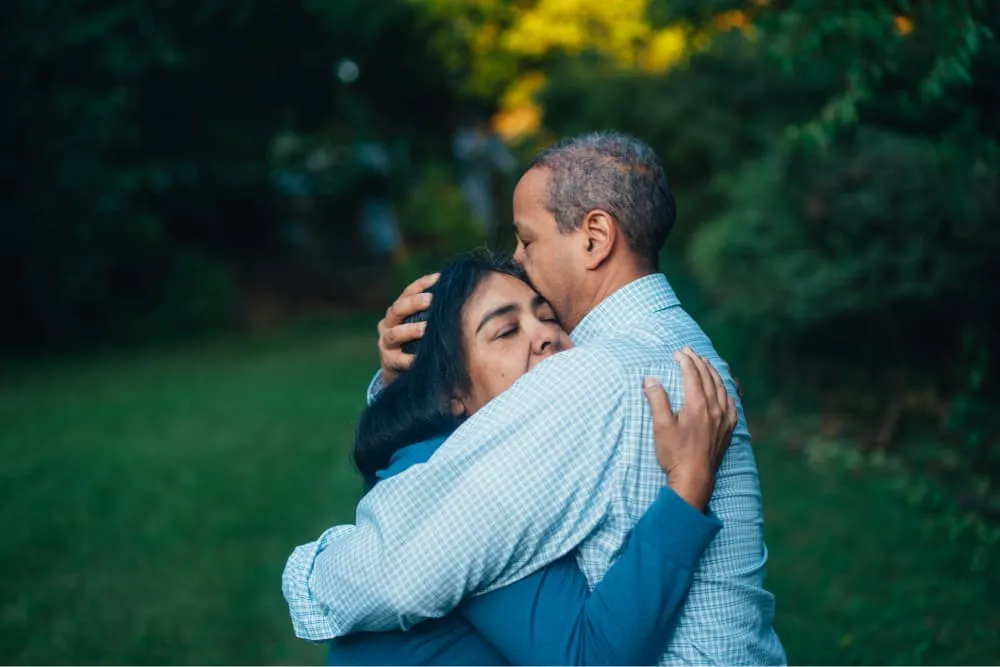Understanding how to treat eating disorders at home
Eating disorder treatment at home has been available for some time, with patients generally working through their disordered behavior through a combination of workbooks and occasional in-person visits, phone calls, or support group or group therapy sessions.
But with the advance of technology, it's possible to practice even more powerful versions of eating disorder home treatment. The internet allows for teletherapy and telemedicine, with patients staying connected with their healthcare providers through websites, apps, and over the phone, all while staying at home.
Take our self-assessment questionnaire
At-home treatment options for eating disorders
Eating disorder treatment generally involves a mix of one-on-one and family therapy, dietary support, counseling, support groups, and medication.
Starting treatment early can minimize or avoid future issues altogether while promoting healthy eating behaviors and other improvements to everyday life. Still, the level of care required usually depends on how severe the disorder is for the individual.
In some situations, intensive outpatient treatments might be an option based on how severe the disorder is and what kind of treatment the individual needs.4,3,13,14 However, patients can also receive at-home care for eating disorders on a day program or outpatient program level.
Call Within today to speak to a treatment advisor.
Get help now How effective is eating disorder home treatment?
Supporters of eating disorder home treatment highlight many benefits, such as reduced cost and increased family involvement.5 Results from studies show that at-home care, such as guided self-help and online interventions, can be highly effective in reducing eating disorder symptoms and behaviors and improving quality of life.6
One study compared the effectiveness of two different family-based treatment programs for adolescent anorexia nervosa: one delivered in a day treatment program and one delivered in an outpatient setting. The results showed that both programs were effective in promoting weight restoration and reducing eating disorder symptoms, but (and here’s the key) the outpatient program was associated with better outcomes for those who lived at home with their families.7
Outpatient treatment amongst those who live at home with their families may have better outcomes.
Another study found that telehealth services for eating disorder patients during the COVID-19 pandemic led to significant improvements in symptoms and mood, with patients rating the treatment quality and therapeutic alliance highly. This suggested that telehealth is an acceptable alternative to face-to-face therapy in such circumstances.8
A randomized controlled trial that compared the effectiveness of virtual family-based treatment (FBT) with standard FBT for adolescent anorexia nervosa showed that virtual FBT was as effective as standard FBT in promoting weight restoration and reducing eating disorder symptoms and was associated with high levels of treatment satisfaction.9
Benefits of eating disorder recovery at home
At-home treatment for eating disorders offers perks like easier access to specialized mental health care, especially for those in remote or rural areas. It's a handy, cost-friendly solution that cuts out travel and even time off work.
Telepsychiatry has also been successful in treating mental health problems, including depression, anxiety, and substance use disorders, all conditions that often go hand-in-hand with eating disorders.10,11
Telehealth can be offered at several levels of care, with programs tailored for day program treatment, intensive outpatient care, or outpatient treatment, depending on an individual’s specific needs.
What we offer at Within

Partial hospitalization and intensive outpatient programs

Personalized meal delivery

Insurance options

Dedicated care team

Schedule tailored to your individual needs

Family involvement

Post-treatment alumni program
Possible setbacks of eating disorder home care
While home treatment for eating disorders offers many benefits, it's important to keep in mind that it doesn't work for everyone.12
It is important to mention to your treatment team if you have experienced any of the following symptoms, as it may make treatment from home more challenging:
- Fainting spells
- Low blood pressure (<80/60) or persistently low heart rate (<40)
- Going days to weeks without eating or drinking
- Suicidal ideation
- Severe depression
- Concurrent excessive substance use
- Uncontrolled diabetes, or other health conditions like heart disease
- Severe dehydration
While this is not a comprehensive list, inpatient treatment is generally the safest option in these cases. So, good communication with your healthcare providers is crucial to finding what works best.
Eating disorder home treatment at Within
What underpins the effectiveness of virtual care is the continuity it offers. Your healthcare providers are with you every step through treatment and recovery at your own pace. Moreover, virtual care can be personalized to fit your needs and preferences.
At Within, we have a team of multidisciplinary experts who can help address the various emotional, psychological, and physical issues that work to develop and maintain unhealthy eating behaviors and thoughts.
Our team will create a tailored program for you based on your specific history and needs, allowing you to benefit from various options, including virtual support groups and individual teletherapy sessions.
Remote eating disorder recovery
While home recovery from an eating disorder may present hurdles, virtual care can act as a bridge, linking intensive inpatient treatment and home recovery. With ongoing support, consistent care, and custom treatment choices, virtual care at Within can instill confidence and drive success in your recovery journey.
Get help today 




























%2520THUMB.webp)






























.webp)
































